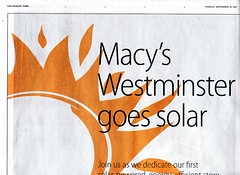. . . & Walmart & Whole Foods & BP & a lot of others!
This is from an ad in the LA TImes on Wednesday. Some of the text readsJoin us as we dedicate our first solar-powered, energy-efficient store Friday, September 28.Congratulations, Macy's!
Enjoy energy-conscious events taking place throughout the day. Plus, be one of the first to arrive and receive a free eco-tote.
This installation, the first of 28 Macy's stores in California in partnership with SunPower Corporation, will help reduce our energy consumption as well as our greenhouse gas emissions. It's all part of Macy's commitment to cleaner technology, a healthy environment and a more sustainable future.
I found an article online about this, which I thought was very good: blogs.business2.com/greenwombat/2007/06/macys_solar.html
...and an AP article: More firms focus on climate change
A report finds more widespread disclosure of carbon emissions by the biggest companies.
The thing is, companies are discovering that keeping track of their energy use is good business that very clearly improves the bottom line.
I learned just that taking courses in Environental Management in Denmark 10 years ago, but the US government was so busy telling everyone that doing anything about global warming would hurt the US economy big time, that no one even tried to investigate if it was true. So European and Japanese companies are way ahead in areas where US companies were first movers back in the 70's!
Walmart and Whole Foods are also busily putting panels on their expansive roofs, adn there was an article in the LATimes this week with a picture of a very sculptural new BP station equipped with solar panels. And Ted Turner did a keynote speech at this week's www.solarpowerconference.com/ with 12,500 participants (I wish I’d gone!) You can watch webcasts, including Turner’s keynote speech, from the conference website.
Just thinking about all that wonderful space for solar panels is really exciting! And I figure the panels on the roofs will shade them somewhat, so they won't need as much airconditioning in the summer. I discussed this with our local Vons (Safeway) manager. He had been reading about SunEdison, which is working with Whole Foods, and thought it was a great idea. I have also thought that parking lots would be a great place for panels, which would also help shade the cars in the summer!











7 comments:
My brother sent me an interesting article about how Google is greening:
The Greening of Google , which starts:
It's another brilliant day at the world headquarters of the hottest company on the planet. Some shirtless employees are playing a lunchtime game of volleyball while others stride across campus with laptops tucked under their arms. The place fairly crackles with energy, and in more ways than one.
Up here on a roof at Google's leafy and sprawling Mountain View, Calif., campus, with the shouts of the volleyball game just barely audible, sunlight glints off 9212 polysilicon solar panels stretching out toward the horizon. Amid the irregular jumble of angular roofs, a single south-facing wave stands out, a pitch and roll frozen in place against a backdrop of foothills.
Today, like most days, the panels will generate 9000 kilowatt-hours of electricity before the sun fades into a fat orange ball and disappears into the Pacific. All are connected to Mountain View's section of the electricity grid. The solar modules blanket virtually all the free roof space on the eight buildings at the center of the Googleplex.
Be sure to click the link to see the illustrations and read the whole (long) article.
And another:
Kohl's Activates Largest Rooftop Solar Rollout in U.S. History
State Officials Flip Switch to Initiate Delivery of Solar Energy to 63 Kohl's California Locations
Press Release from SunEdison September 26, 2007 LAGUNA NIGUEL, CA
Today Kohl's Department Stores (NYSE:KSS) flipped the switch on a rooftop solar energy system at its Laguna Niguel store as part of the largest planned U.S. photovoltaic solar rollout to date. Michael R. Peevey, president of the California Public Utilities Commission, joined Kohl's to celebrate this significant step toward the building of solar electric systems at 63 of Kohl's 80 California locations, which will total approximately 25 megawatts (MW). At completion, Kohl's solar program will represent approximately 15 percent of California's photovoltaic installations to date.
Kohl's is working closely with the State of California to help meet the goals set by Governor Schwarzenegger and the Public Utility Commission. Under the 2007 California Solar Initiative (CSI) program, the state expects to build solar power systems totaling 3,000 MW of solar power by 2017. At 25 MW, the total projected capacity of the Kohl’s solar systems will be larger than that of the top five largest completed photovoltaic systems in the United States combined.
California PUC President Peevey said, “This marks another milestone in meeting California’s commitment to lead the nation in producing and using clean renewable energy. Solar is an important part of California’s goals in doing what is right for our businesses, citizens and the environment. I commend Kohl’s for its leadership.”
Once completed, Kohl’s use of solar power will generate more than 35 million kilowatt-hours (kWh) of renewable energy annually, the equivalent of powering an estimated 3,087 California homes. Additionally, in the first full year of operation, Kohl’s clean energy output will offset more than 28 million pounds of carbon dioxide (CO2), a greenhouse gas directly linked to global climate change. Over the span of 20 years, Kohl’s solar deployment will prevent in excess of 515 million pounds of carbon dioxide (CO2) emissions.
(Click the link to read more...)
And then there's Walmart, "the Green Machine"
Wal-Mart, you see, has decided to help save the earth.
.....
Environmental values
Just listen to [CEO Lee]Scott. "To me," he says, "there can't be anything good about putting all these chemicals in the air. There can't be anything good about the smog you see in cities. There can't be anything good about putting chemicals in these rivers in Third World countries so that somebody can buy an item for less money in a developed country. Those things are just inherently wrong, whether you are an environmentalist or not."
In a speech broadcast to all of Wal-Mart's facilities last November, Scott set several ambitious goals: Increase the efficiency of its vehicle fleet by 25% over the next three years, and double efficiency in ten years. Eliminate 30% of the energy used in stores. Reduce solid waste from U.S. stores by 25% in three years.
Wal-Mart says it will invest $500 million in sustainability projects, and the company has done a lot more than draw up targets. It has quickly become, for instance, the biggest seller of organic milk and the biggest buyer of organic cotton in the world. It is working with suppliers to figure out ways to cut down on packaging and energy costs. It has opened two "green" supercenters.
Credibility questioned
Plenty of people won't buy it - or anything else from Wal-Mart. To labor leaders, left-wing elites, and the small-is-beautiful crowd, the $312-billion-a-year retailer stands for everything that's wrong with big business.
They see the company in a race to pave the planet and turn it into a giant emporium of cheap goods built on the back of cheap labor. The union-funded website walmartwatch.com dismisses Wal-Mart's environmental push as a "high-priced green-washing campaign."
Wal-Mart, though, has a whole lot more to worry about than convincing a few ideological critics that its eco-intentions are pure. Its business, for starters.
{There's a lot more, if you click the link to the article)
Frito-Lay 'Flips Switch' on Solar Power at Phoenix Facility
Arizona's Largest Private Sector Photovoltaic System Dedicated Today
Press Release from KYOCERA Solar, Inc.
Phoenix, Arizona
Frito-Lay employees today dedicated the new solar electric power system that has been installed on the roof of their Arizona Service Center, the company's largest distribution center in the country. The 201-kilowatt system, made up of more than 1,000 Kyocera high output 200-watt photovoltaic (PV) modules, is the largest business-owned PV system in Arizona. The system will produce roughly 350,000 kilowatt hours of electricity.
Wal-Mart and BP Solar Announce Installation of First Solar Power Pilot Project
Wal-Mart's Santa Ana Store is First to Receive Solar Power System in California
Press Release from BP Solar
Santa Ana, CA, Oct. 3, 2007
Wal-Mart Stores, Inc. (NYSE:WMT) and BP Solar today announced the installation of the first solar power system that Wal-Mart introduced in May 2007. The 623.7kW solar system is part of a major purchase of solar power from BP Solar and other solar power providers for approximately 22 Wal-Mart stores, Sam's Clubs and distribution centers in Hawaii and California. The stores included in the pilot project are expected to achieve savings over their current utility rates immediately-as soon as the first day of operation.
I found this interesting article in my Renewable Energy Access newsletter:
Lessons Learned on Display at Wal-Mart's Sustainability Summit
by Joel Makower, Greener World Media November 5, 2007
Last month's Live Better Sustainability Summit, held just outside of Bentonville, Arkansas, was yet another in what seems to be an accelerating series of "whoda thunk" moments.
Wal-Mart isn't exactly asking suppliers to think and act more proactively on the environmental front. It's using its considerable clout to create almost a competitive atmosphere around "green."
Bentonville, of course, is hometown to Wal-Mart, which sponsored the event, a daylong conclave that brought together more than a thousand people to a nearby convention center. It was all part of Wal-Mart's latest crusade: to "drive profitable product innovation" into its supply chain.
More on Frito Lay
Frito-Lay plans environmentally neutral potato chip
Post a Comment